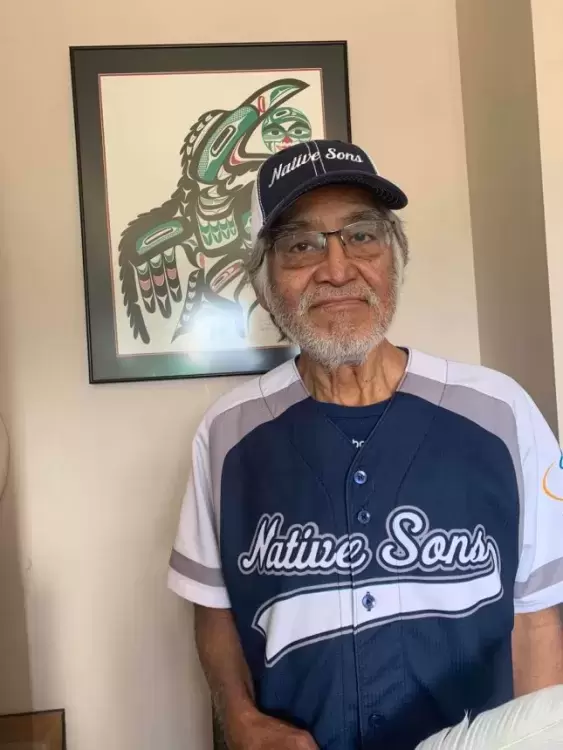Long-time sports advocate Wally Samuel Sr. has been appointed to the board of directors of a provincial group.
Earlier this month the 73-year-old member of Ahousaht First Nation was one of nine individuals chosen for the Indigenous Sport, Physical Activity & Recreation Council (I·SPARC) board.
I-SPARC was officially formed back in 2009 to improve the health and well-being of Indigenous people throughout British Columbia. This followed the signing of an agreement between the First Nations Health Council, Metis Nation BC and the BC Association of Aboriginal Friendship Centres (BCAAFC).
Since I-SPARC’s inception, the BCAAFC has served as its host agency. But now that its inaugural board is in place, I-SPARC will work towards having its own governance plan.
“It’s getting so big and it’s a little hard for the (BCAAFC) staff to do all the work,” Samuel said.
He should know. He’s been involved with countless I-SPARC initiatives, serving as a volunteer for his community and surrounding areas, since the organization was launched. Samuel said he is thrilled he was one of those chosen to be part of I-SPARC’s board.
“I’m glad I was put on it,” he said. “But I can’t do this forever. We need some younger people to get involved.”
Corninne McKay of Nisga’a Nation will serve as the board’s president. Also, Alan Edkins, representing Metis Nation BC, will serve as vice-president while Cheryl Charlie from Sts’ailes Nation, will have the dual roles of secretary and treasurer.
Joining Samuel as directors on the board will be Don Courson and Curtis Smecher, both representing Métis Nation BC. And the other directors are Annette Morgan (Gitxsan), Milly Price (Wei Wai Kai First Nation) and Travis Kruger (Penticton Indian Band). Those named to the board will serve all serve nine-month terms. The plan is to elect a new board in 2021.
“There will be an election next year depending on how things are (with the pandemic),” Samuel said.
So far this year Samuel has seen a handful of prestigious sporting events that he normally attends and/or has a role in cancelled because of the pandemic.
For starters, the kibosh was put on the Junior All Native Tournament, a youth basketball event which had been scheduled for Kelowna in mid-March.
Also, the 2020 Canadian Native Fastball Championships, which were set for early August in Prince George, will not be taking place.
And in the spring the Nuu-chah-nulth Tribal Council’s board of directors decided to cancel their annual Tlu-piich Games. The multi-sport event, traditionally held in Port Alberni in August, features athletes from Nuu-chah-nulth First Nations.
“It’s for safety precautions, I understand that,” Samuel said about the Tlupiich Games’ cancellation. “Plus, not too many people have been able to go out and do training or fundraising (for the Games).”
Though various events have been cancelled due to COVID-19, Samuel believes individuals can still maintain their fitness these days despite varying lockdowns and restrictions.
“I hope they are still out there jogging or walking or shooting a ball,” he said. “You can still do things but not with a whole team. You can still do things with a friend or a family member.”
Over the years I-SPARC representatives have worked with First Nations, Métis communities, friendship centres, schools and other sport and physical activity shareholders to deliver programs which promote active lifestyles and healthy well-being in Indigenous communities. Samuel would love to see this aim continue.
“Hopefully the First Nations will get together and they’ll make youth activities a priority,” he said. “I understand it can be hard organizing things. But there is training available for recreation workers. And it does have a great effect on communities when they get the right people in there.”
Samuel added communities should do their best to ensure they are hiring quality staff members to head up sports programs.
“To be a sports worker, you have to be a committed sports person and not just look at it as a job,” he said.
Samuel added it can be difficult for communities to hire the right people for sports programming positions.
“It’s up to each community to do that,” he said. “And there are a lot of resources for that.”
Even before the COVID-19 pandemic encouraged people to stay indoors, Samuel believes it’s become increasingly difficult to remain involved in a number of sporting activities.
“I’ve noticed young kids and even young parents are still not as active as they were in the 1960s, ‘70s and ‘80s,” he said.
Samuel believes one of the reasons for this is because of the hours people are working.
“Nowadays work schedules are much different,” he said, adding in past decades the majority of those with jobs primarily worked weekdays from 9 a.m. until 5 p.m., allowing for time to take part in various sporting activities weekday evenings and on weekends. “Now they have to work weekends and different shifts.”







